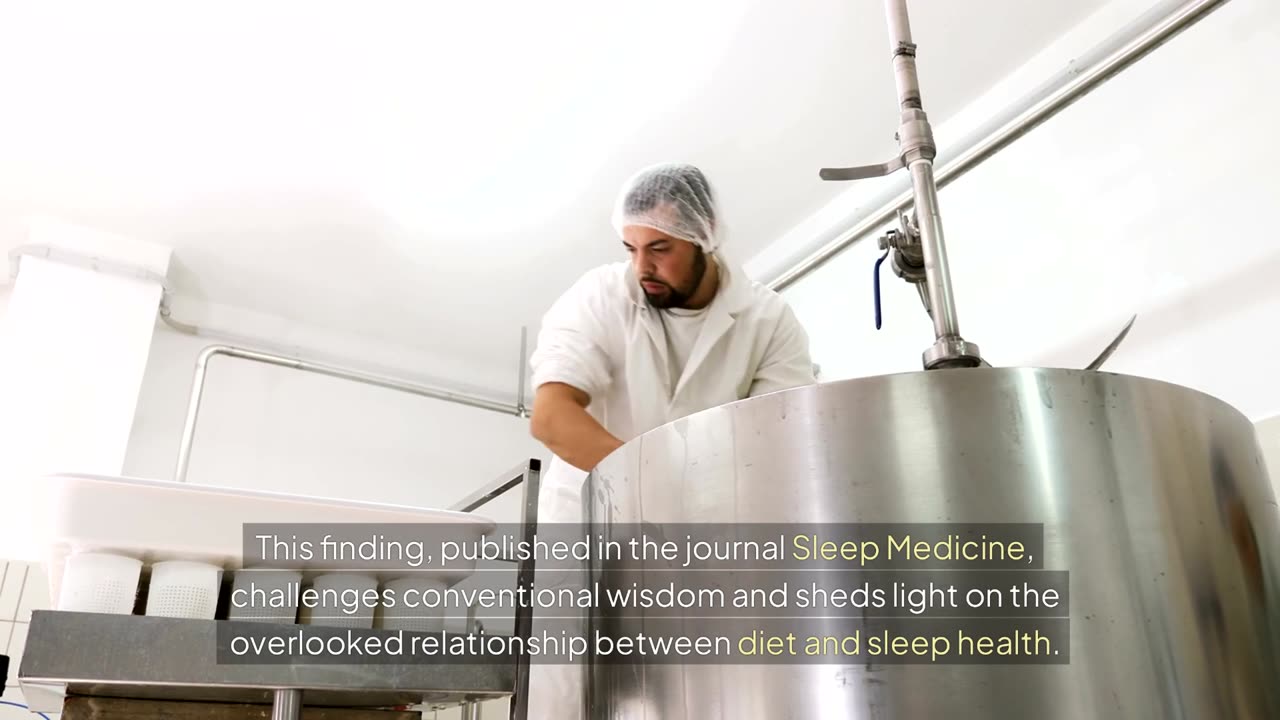Premium Only Content

The Cheesy Secret to Better Sleep: How Your Diet Impacts Snoring and Sleep Apnoea*
### **Introduction: Could Cheese Hold the Key to a Silent Night?**
We’ve all heard it: avoid cheese before bed—it might make you snore louder! But what if the opposite were true? A groundbreaking study involving 400,000 people in the UK suggests that cheese might actually *reduce* the risk of sleep apnoea, a condition closely linked to snoring and disrupted sleep.
This revelation is a game-changer, challenging long-held beliefs about diet and sleep. But how does a slice of cheddar—or camembert—connect to a restful night? Read on to uncover the surprising science and how this cheesy insight might transform your bedtime routine.
---
### **1. Understanding Sleep Apnoea: The Silent Sleep Disruptor**
#### **What Is Sleep Apnoea?**
Sleep apnoea is a serious sleep disorder where the throat’s walls relax too much during sleep, causing them to narrow or close temporarily. This leads to breathing pauses that disrupt sleep and often cause loud, persistent snoring.
An estimated 3.9 million people in the UK suffer from moderate to severe obstructive sleep apnoea (OSA), the most common form of the condition. Many remain undiagnosed, enduring fatigue, poor health, and the occasional jab in the ribs from frustrated partners.
#### **Why Snoring Isn’t Always Harmless**
While snoring can be harmless, it often signals deeper issues. The louder the snoring, the higher the likelihood of underlying conditions like OSA. Sleep apnoea can increase the risk of heart disease, high blood pressure, and other serious health issues if left untreated.
---
### **2. Cheese and Sleep: The Surprising Connection**
#### **The Research That Turned Heads**
Forget the old myths about cheese before bed. Researchers from Chengdu University, China, have found a surprising link: regular cheese consumption is associated with a 28% lower risk of developing sleep apnoea. This discovery, published in *Sleep Medicine*, highlights a previously overlooked connection between diet and sleep health.
#### **Why Cheese? The Science Behind It**
The study suggests over 20 ways cheese might reduce the risk of sleep apnoea, including:
- **Lowering blood pressure**: High blood pressure is a known risk factor for sleep apnoea, and compounds in cheese may help keep it in check.
- **Increasing testosterone**: Higher testosterone levels have been linked to improved muscle tone in the throat, which could reduce the likelihood of airway collapse during sleep.
---
### **3. Debunking the Dairy Myth: Cheese and Snoring**
#### **Myth: Cheese Causes Snoring**
For years, people have been warned against consuming dairy products like cheese before bed, based on the belief that they increase mucus production and clog airways. However, there’s little scientific evidence to support this claim.
#### **Fact: Cheese May Actually Help**
Instead of worsening snoring, cheese might improve sleep quality by supporting hormonal balance and cardiovascular health. If you’re a snorer—or share a bed with one—it might be time to rethink your nighttime snack.
---
### **4. Beyond Cheese: The Role of Diet in Sleep Health**
#### **The Bigger Picture**
Cheese is just one piece of the puzzle. The study underscores the importance of diet in managing conditions like sleep apnoea. High-sodium, processed foods can exacerbate issues, while nutrient-rich, whole foods can promote better sleep.
#### **Other Foods That Might Help**
- **Leafy Greens**: Rich in magnesium, which relaxes muscles and promotes better breathing.
- **Fatty Fish**: High in omega-3 fatty acids, which reduce inflammation and support respiratory health.
- **Nuts and Seeds**: Packed with tryptophan, a precursor to melatonin, the sleep hormone.
---
### **5. What This Means for You: Practical Steps to Sleep Better**
#### **1. Add Cheese to Your Diet (In Moderation)**
Incorporating cheese into your meals could be a simple way to support sleep health. Opt for high-quality varieties like cheddar, camembert, or manchego, and pair them with whole-grain crackers or fresh fruit for a balanced snack.
#### **2. Focus on Overall Nutrition**
A balanced diet rich in vitamins and minerals can reduce inflammation and support better sleep. Limit processed foods, caffeine, and alcohol close to bedtime.
#### **3. Seek Medical Advice for Snoring or Sleep Apnoea**
If snoring or sleep disruption is a persistent issue, consult a healthcare provider. Early diagnosis and treatment of sleep apnoea can improve quality of life and reduce long-term health risks.
---
### **Conclusion: Say Cheese to Better Sleep!**
The connection between diet and sleep is more significant than we ever imagined, and the humble cheese slice may hold the key to a quieter, more restful night. By debunking old myths and embracing new research, we can take meaningful steps toward better sleep and overall health.
What do you think about this cheesy revelation? Have you noticed a connection between your diet and your sleep quality? Let us know in the comments below!
Don’t forget to **like, share, and subscribe** for more insights into health, wellness, and the surprising ways science can improve your life. Sweet dreams, everyone!
-
 LIVE
LIVE
The Jimmy Dore Show
1 hour agoPutin Offers U.S. a BETTER DEAL on Rare Earth Metals! Flu Shots Are a Proven Scam! w/ Mikki Willis
8,723 watching -
 42:47
42:47
Kimberly Guilfoyle
5 hours agoThe Trump effect: More Major Investment, Plus America First at Home & Abroad. Live w/Ned Ryun & Brett Tolman | Ep. 201
42.8K16 -
 1:29:23
1:29:23
Redacted News
3 hours agoWW3 ALERT! Europe pushes for war against Russia as Trump pushes peace and cutting off Zelensky
69.2K176 -
 LIVE
LIVE
Dr Disrespect
8 hours ago🔴LIVE - DR DISRESPECT - PUBG - 5 CHICKEN DINNERS CHALLENGE!
2,323 watching -
 57:56
57:56
Candace Show Podcast
7 hours agoHarvey Speaks: The Project Runway Production | Ep 1
61.9K39 -
 LIVE
LIVE
LFA TV
1 day agoEurope’s Relationship With America Is Over | TRUMPET DAILY 3.3.25 7PM
311 watching -
 LIVE
LIVE
Quite Frankly
5 hours ago"European Deth Pact, Blackout Data Breach, More" ft. Jason Bermas 3/3/25
1,050 watching -
 LIVE
LIVE
2 MIKES LIVE
2 hours ago2 MIKES LIVE #187 Deep Dive Monday!
128 watching -
 44:25
44:25
CatfishedOnline
3 hours agoRacist Lady Shocked After Sending Money to a Nigeria Romance Scammer
3.34K3 -
 56:45
56:45
VSiNLive
3 hours agoFollow the Money with Mitch Moss & Pauly Howard | Hour 1
30.9K